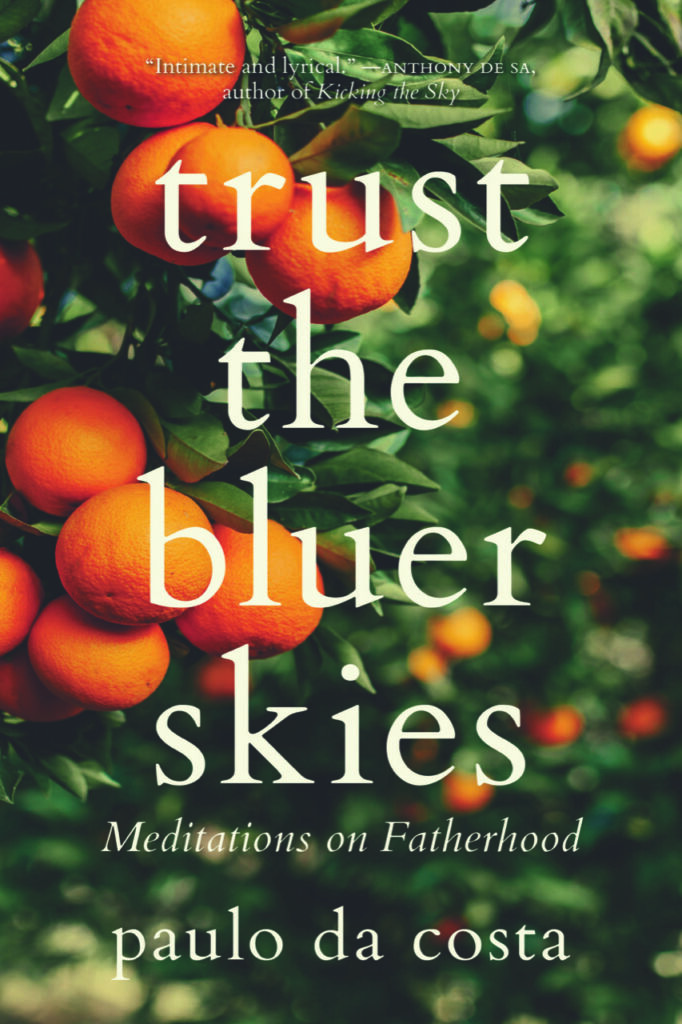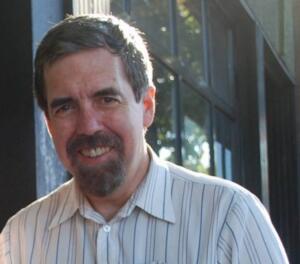Fatherhood in a new land
Trust the Bluer Skies: Meditations on Fatherhood
by paulo da costa
Regina: University of Regina Press, 2024
$27.95 / 9780889779921
Reviewed by Sheldon Goldfarb
*

The first part of this book is delightful. There’s young Koah with his Portuguese-Canadian father (author paulo da costa) travelling back to his father’s ancestral homeland and imbibing words of wisdom from his father, who introduces him to his grandparents and extended family, all the connections missing from their life together in Victoria, BC.
Koah is a gentle four-year-old who knows about worms and butterflies, and is very protective of his younger sister, impressing his father, who however worries about protecting him. Where is the boundary between spontaneity and caution: should a four-year-old be careful or carefree? And when Koah trips in the woods near where their Portuguese family lives, his father notes that even beauty can sting.
The early parts of the book contain nuanced observations like this and also create a lyrical elegiac mood. Koah worries about death, tries to revive a daisy his sister has trampled on, and is afraid that his father will die. The author meditates on death as well, saying that Koah’s grandparents seem to be waiting for it and his grandfather especially seems to have given up on life – and yet Koah persists and gets his grandfather to play games, tell stories, and come alive.
And the author’s memories come flooding back: I used to sit in this very spot where you are now, he says to Koah. And they sit down to traditional meals and it all seems like a wonderful idyll full of life lessons – but then the lessons become more insistent and take over the book.
Even early on it seems there is an agenda lurking in the background. Da costa makes offhand remarks about the highways eating up the fields he remembers, and then he worries that the school Koah is attending is turning him into an automaton ready for the world of boring office work. Or the school is too rough, and Koah is learning to be too aggressive. He wants Koah to remain gentle while asserting his boundaries. Fair enough, but soon he is imposing boundaries on Koah. The family are ardent soccer (or futebol) fans; they have a team they cheer for; they try to give Koah the team’s jersey, but his father won’t allow it: that would mean buying into a violent tribalism where winning is the only thing and people suffer. Why, remember that soccer match where English fans attacked Italians and 39 people died. And he hears stories of soccer fans disappointed in a loss going home and taking out their frustrations on their wives.

Earlier there is the strange episode of the escalator in the mall. Koah is fascinated, it’s his first escalator, he wants to ride up and down on it, but his father says no, needs to “rescue” him from this symbol of modernity or commercialism, this device that traps you like a sardine. It is an odd comparison. Better to be a coyote than a sardine, da costa says a moment later, because then you can live on the margins away from the world of competition, aggression, and the profit motive.
At one point da costa condemns beer, cigarettes, cable TV, and cellphones. It is oddly reminiscent of Pilgrim’s Progress, where the evils of life are condemned along with more positive things. Or perhaps da costa is more in the tradition of Wordsworth and the Romantic poets, or Henry David Thoreau, condemning the “gospel of the industrial revolution,” as he puts it, and the race to become a corporate executive, the world of suits and ties that squanders our resources. There is an environmentalism here, along with a defence of animal rights, but a curiously old-fashioned one. No mention of carbon or climate change, more a concern with preservation and going back to the land (or the woods), living a life away from competition, changing the world by going back to an earlier age.
But not the traditional age of his Portuguese ancestors: that’s too violent and cruel, especially towards animals: full of hunting and putting animals in cages. Koah recoils from that, but Koah likes things his father disapproves of: the escalator and also chocolate Easter eggs, which to his father are part of commercialism. Perhaps in Victoria there’s a better life, with safer playgrounds, no corporal punishment, and just more space: perhaps the answer is not pre-industrial, but post?
But in Victoria people value pets more than children, da costa says, and there’s no hugging. So, what is a parent to do?
On a subsequent visit to Portugal, da costa learns that his family has adopted some of his vegan suggestions. Open-minded of them, but da costa himself doesn’t seem to be able to meet them halfway. Perhaps as a result he feels a wound of separation, and he thinks of the aches he caused by leaving Portugal. Of course, any separation causes aches, but somehow one thinks that things might have been better if only he had let Koah wear that soccer jersey.
*

Sheldon Goldfarb is the author of The Hundred-Year Trek: A History of Student Life at UBC (Heritage House, 2017), reviewed by Herbert Rosengarten. He has been the archivist for the UBC student society (the AMS) for more than twenty years and has also written a murder mystery and two academic books on the Victorian author William Makepeace Thackeray. His murder mystery, Remember, Remember (Bristol: UKA Press), was nominated for an Arthur Ellis crime writing award in 2005. His latest book, Sherlockian Musings: Thoughts on the Sherlock Holmes Stories (London: MX Publishing, 2019), was reviewed in the BC Review by Patrick McDonagh. Originally from Montreal, Sheldon has a history degree from McGill University, a master’s degree in English from the University of Manitoba, and two degrees from the University of British Columbia: a PhD in English and a master’s degree in archival studies. [Editor’s note: For The British Columbia Review, Sheldon Goldfarb has reviewed books by Chris Honey, Andrew Platten, Marcello Di Cintio, R. F. Vincent, Nick Marino, Joel Heng Hartse, and Sebastien de Castell and he has contributed a comedic poem, “The Ramen,” based on Poe’s “The Raven.”]
*
The British Columbia Review
Interim Editors, 2023-25: Trevor Marc Hughes (non-fiction), Brett Josef Grubisic (fiction and poetry)
Publisher: Richard Mackie
Formerly The Ormsby Review, The British Columbia Review is an online book review and journal service for BC writers and readers. The Advisory Board now consists of Jean Barman, Wade Davis, Robin Fisher, Barry Gough, Hugh Johnston, Kathy Mezei, Patricia Roy, Maria Tippett, and Graeme Wynn. Provincial Government Patron (since September 2018): Creative BC. Honorary Patron: Yosef Wosk. Scholarly Patron: SFU Graduate Liberal Studies. The British Columbia Review was founded in 2016 by Richard Mackie and Alan Twigg.
“Only connect.” – E.M. Forster